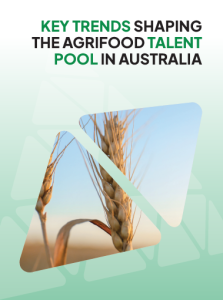Develop a Resilient Workforce to Thrive in the Future
Future work environments need a more proactive, positive work culture that promotes employee well-being and engagement
The labour shortage in regional Australia is having a profound impact on many agribusinesses. The struggle to attract, select, and retain employees, is having a direct impact on their abilities to maintain operations and remain competitive in the market.
To compete in the current talent market and prepare for the future of work, agricultural businesses need to evolve beyond traditional HR practices. Traditional Human Resource (HR) theories and practices that were designed for the industrial age are no longer competitive or relevant to today’s digital age, global connectivity, automation, and new generations entering the workforce. Agricultural businesses need to concentrate on optimising work design and providing resources that empower and support employees, not only in performing their roles with well-being as a priority but also preparing employees and their business for the future of work and the skills that will be necessary to compete in the local and global market.
Here are some ways to cultivate a more durable workforce for the future:
- Agricultural businesses need to examine how jobs are structured, identify areas where tasks can be automated or streamlined, and pinpoint skills and capabilities that are necessary for future success in the sector. Future skills will include digital literacy and technological proficiency, critical thinking and problem-solving, communication, creativity, innovation, adaptability, emotional intelligence, autonomy, continuous learning, as well as self-care;
- Future work environments need a more proactive, positive work culture that promotes employee well-being and engagement;
- Develop a fast-thinking organisation that can look to the future and change quickly to accommodate challenges relevant to the digitisation and globalisation. Therefore, investing in a more “human-centered design” work environment, rather than a “production-centered design,” that offers flexible work arrangements such as job sharing or hybrid work environments, developing future skills for future work, focusing on transferable skills, and creating opportunities for multi-pronged career advancement and professional growth, can all be great approaches for businesses to attract and retain top talent.
Agribusinesses must move beyond traditional HR practices and focus on the future. Marketing and sales have been significantly transformed due to globalisation, and now our workplaces must follow suit. Adopting this approach can enable organisations to establish a workplace culture that not only attracts the best talent but also promotes engagement and sustainability, ensuring the long-term success of their operations and the industry. This change in mindset has the potential to support the agriculture sector in overcoming the current labour shortage and develop a resilient workforce for the future.
Article written By Lauren McNally, Senior Agribusiness Consultant of Agricultural Appointments. Connect with Lauren on Linkedin.
The Latest Updates
Let’s look at the current trends in job demand and talent availability in the agriculture and agribusiness sector in Australia over the second half of 2023 and the first quarter of 2024. There was a weakening of job demand in this sector but a slight improvement in candidate availability and job interest during this period….
In times past, people’s working lives often played out over many years at one company, but now the world has vastly changed. These days it is common to shift between jobs and organisations, but this practice raises questions as to what is today considered the Goldilocks time to spend in a job? How often do…
Employee retention matters. Organisational issues such as training time and investment, lost knowledge, mourning, insecure co-workers and a costly candidate search aside; failing to retain a key employee is costly. Various estimates suggest that losing a middle manager costs an organisation up to 100 percent of their salary. The loss of a senior executive is…











